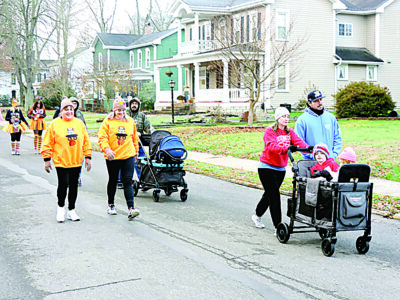State Treasurer Pack lays out broad legislative agenda

LAYING OUT THE AGENDA – State Treasurer Larry Pack takes questions Monday regarding his office’s legislative agenda during a press conference at the State Capitol Building. -- Steven Allen Adams
CHARLESTON — The State Treasurer’s Office may have a limited role in West Virginia government, but that didn’t stop the state’s chief financial officer from calling for a legislative agenda that called for tax cuts for workers while recommending additional education spending.
State Treasurer Larry Pack held a press conference Monday morning at his offices in the east wing of the State Capitol Building to lay out a legislative agenda for the 2026 regular session beginning Jan. 14.
“We take our responsibility as chief financial officer for the State of West Virginia very, very seriously,” Pack said. “We think we have a duty to advise the governor, to advise the Legislature, and really all West Virginia taxpayers and citizens on sound conservative and sound policy for the State of West Virginia.”
At the top of Pack’s priority list is defending the Hope Scholarship educational voucher program as it gets ready to open up to all eligible public, private, and homeschool students beginning July 1, 2026. Pack said he would fight any attempt by the Legislature to limit, cap or restrict the program.
“We believe it is crucial that the Legislature and the governor resist any temptation to roll back universal eligibility,” Pack said. “There’s been a dynamic shift in our country where money is now following students, and it empowers the parents and children alike to find the right education that fits their needs. It’s been a great win for West Virginia.”
For the current fiscal year, the Hope Scholarship provided students up to $5,267.38 – the equivalent of the per-pupil expenditure made available to counties through the state school aid formula. Approximately 15,000 students were approved for 100 percent funding through the Hope Scholarship program for the current school year.
Only students leaving the public school system are eligible for the Hope Scholarship this fiscal year, which was allotted $110 million for the current fiscal year – up from $45 million in the previous fiscal year. The program’s cost was estimated to balloon to more than $300 million in the next fiscal year when Hope opens up to all students, though an updated estimate by the State Treasurer’s Office places the cost next fiscal year closer to $244.6 million.
Gov. Patrick Morrisey is a vocal supporter of the Hope Scholarship and the idea of universal school choice. But some Republican lawmakers began questioning the growing costs of the program on the floor of the House of Delegates at the end of the 2025 legislative session last April.
“Even President Donald Trump has made school choice a top issue for his administration,” Pack said. “I know that many debate the cost benefit of the program, but the reality is that Hope is truly changing lives in the Mountain State. We will continue to fight for those who utilize the program and advocate for education as a whole moving forward.”
Other legislative priorities dealing with the functions of the State Treasurer’s Office include an unclaimed property consumer protection bill to protect owners of unclaimed property from being scammed by out-of-state companies; and another attempt at term limits for elected members of the Board of Public Works, which include the state treasurer, state auditor, attorney general, and agriculture commissioner. While the governor is limited to two four-year terms, Board of Public Works members have no term limits.
However, other items on Pack’s legislative wish list were outside of the scope of his office. Pack again called for the temporary elimination of state income tax collections on tips and overtime, mirroring Trump’s One Big Beautiful Bill Act, now called the Working Families Tax Cuts Act. At the end of September, Pack called for a special session before the end of the year to pass a tips/overtime tax cut package.
“This is a workers’ tax cut,” Pack said. “These are for nurses. These are for waitresses. These are for the guys working on construction projects. We need to get this done. We need to follow the lead of our president, Donald J. Trump, and pass that in West Virginia.”
As part of that package, the bill allows workers to deduct up to $25,000 in tips annually, while those who receive qualified overtime compensation can deduct the pay that exceeds their regular rate of pay – the “half” in time-and-a-half – up to $12,500 per individual or $25,000 for joint filers annually.
Self-employed workers can only deduct no more than their net income from a trade or business where the tips were earned. The deduction for both the tips and overtime phases out for taxpayers with modified adjusted gross income over $150,000, or $300,000 for joint filers.
The federal tax cuts are retroactive to Jan. 1 but end in tax year 2028. If West Virginia mirrors the federal law, pausing income taxes on tips and overtime could return approximately $25 million to taxpayers, or $75 million over the three-year period.
As part of a plan to help the state’s 55-county public school systems, Pack called for loosening of timelines and requirements on reduction in force (RIF) decisions and transfer of personnel between schools to allow counties to make needed decisions on budgets as enrollment numbers continue to shrink across the state. Pack called for changes to the state school aid formula and how schools can use those funds, including increasing state funding for special education students.
“Most of our students in the State of West Virginia will go through public schools. We have to be pro-public schools,” Pack said. “We have to invest in teachers. We have to invest in classrooms. In addition to that, we need to do some things to give more local control to our county boards of education. We really do hamstring them with the amount of regulations that we put on them.”
Lastly, Pack for additional state funding for teacher pay, with minimum teacher salaries beginning at $50,000 per year, with teachers already making $50,000 receiving a $2,000 increase to their base pay effective on July 1, 2026. Pack said he was following a similar model put in place in Arkansas.
“It’s really worked well for them,” Pack said. “They showed the lead on how to do that, how to invest in public education and put that money back in the classroom and put it in the pockets of our teachers. We really need to get this done. We need to get it done quick.”
Even with proposing a tax cut, Pack – a former Department of Revenue secretary under former governor Jim Justice – said he believes the state’s finances going into fiscal year 2027 are strong enough to handle the growing cost of Hope and proposed changes to the school aid formula and pay raises for teachers.
Fiscal year-to-date general revenue fund collections as of the end of October of $1.789 billion were 6.1 percent above the $1.686 billion revenue estimate, providing the state a $102.9 million surplus with eight months left in the current fiscal year.
According to the September report from the Department of Revenue, the state has more than $161 million in unappropriated monies in the general revenue fund. That’s not counting the $1.4 billion in the state’s two revenue shortfall reserve funds (called the Rainy Day Fund) and $460 million set aside in the personal income tax reserve fund.
“Our revenues are up this year,” Pack said. “We’ll be in good shape as long as we hold the other parts of the budget down and so forth. So, we’re in good shape to do that. But even if we have to go back and revisit some of the other things that we thought were priorities back in the day, there’s no bigger priority than the education of our children.”
While the State Treasurer’s Office has no direct role in setting tax policy or education funding, Pack said he believes his position provides him with an advisory role to both Morrisey and lawmakers.
“As a state chief financial officer, I feel like it’s my responsibility to really speak on anything related to a dollar sign in West Virginia government,” Pack said. “We think it’s our responsibility to talk about things that other people are not talking about and try to raise the profile of certain issues. These are issues we think are important.”






